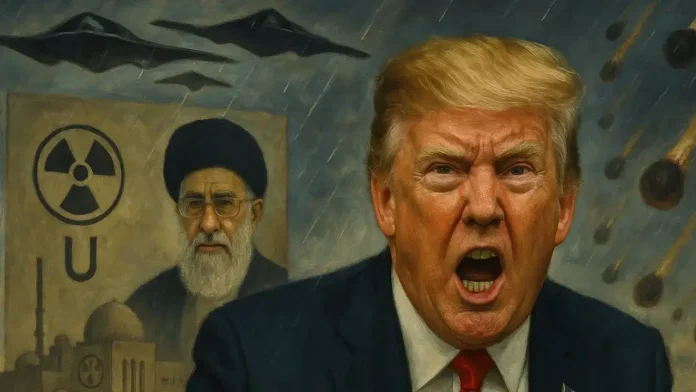On June 25, 2025, President Donald Trump issued a stern warning to Iran, threatening further military action if the country attempts to rebuild its nuclear program.
This statement follows recent U.S. airstrikes on three key Iranian nuclear facilities—Fordow, Natanz, and Isfahan—which Trump claimed “obliterated” Iran’s nuclear capabilities.
The escalating rhetoric comes amid a fragile ceasefire between Iran and Israel, with global leaders urging de-escalation.
This article delves into Trump’s latest threats, the context of the U.S.-Iran conflict, and the broader implications for global security and oil markets.
- Trump’s Threat of Further Strikes: President Trump warned that the U.S. would launch additional attacks if Iran resumes its nuclear enrichment program.
- Recent U.S. Airstrikes: The U.S. struck three Iranian nuclear sites on June 21, 2025, aiming to dismantle Iran’s nuclear capabilities.
- Ceasefire Developments: A ceasefire between Iran and Israel was announced, but Iran’s Foreign Minister denies a formal agreement.
- Global Reactions: Allies like the UK and Australia support the strikes but urge diplomacy, while Iran vows retaliation.
- Economic Impact: Threats to the Strait of Hormuz and rising oil prices raise concerns about a global economic fallout.
Background of the U.S.-Iran Tensions
The U.S.-Iran conflict intensified in June 2025 when Israel launched airstrikes on Iranian nuclear and military targets, prompting Iranian missile attacks on Israeli cities.
On June 21, the U.S. joined the fray, with President Trump announcing “Operation Midnight Hammer,” a series of precision strikes on Iran’s nuclear facilities.
The operation involved B-2 Spirit bombers deploying bunker-buster bombs to target deeply buried sites like Fordow. Trump hailed the strikes as a “spectacular military success,” claiming they destroyed Iran’s nuclear enrichment capacity.
However, leaked intelligence reports suggest the strikes may not have fully eliminated Iran’s nuclear capabilities, prompting Trump to lash out at media outlets like CNN and The New York Times for reporting setbacks.
Iran’s Foreign Minister Abbas Araghchi has warned of “everlasting consequences,” while Supreme Leader Ayatollah Ali Khamenei vowed a strong response, dismissing Trump’s threats as “absurd rhetoric.”
The fragile ceasefire, announced on June 24, remains contentious, with Iran denying any formal agreement.
Trump’s Latest Warning
In a recent statement, Trump reiterated that the U.S. will not allow Iran to pursue nuclear weapons, warning that a second strike was prepared but called off when Iran accepted the ceasefire.
He emphasized that any attempt to rebuild Iran’s nuclear program would trigger further military action.
Trump also claimed that Russian President Vladimir Putin offered assistance in mediating with Iran, though no concrete details have emerged.
Trump’s rhetoric aligns with his long-standing stance against Iran’s nuclear ambitions. He has consistently demanded that Iran abandon uranium enrichment, a position echoed by Vice President JD Vance.
However, Trump clarified that he does not seek regime change in Iran, arguing it would lead to chaos.
This nuanced approach contrasts with earlier speculations that the U.S. and Israel aimed to destabilize Khamenei’s government.
The U.S. Strikes: Operation Midnight Hammer
The U.S. strikes targeted three critical nuclear facilities:
- Fordow: A heavily fortified underground site, hit with Massive Ordnance Penetrator (MOP) bombs.
- Natanz: A key uranium enrichment facility, previously damaged by Israeli strikes.
- Isfahan: A nuclear research center, targeted with cruise missiles and decoy tactics.
Defense Secretary Pete Hegseth described the operation as an “overwhelming success,” noting that no Iranian troops or civilians were targeted.
However, military experts caution that Iran may retain enough highly enriched uranium (HEU) to develop a simple nuclear device if left unchecked.
Iran’s potential withdrawal from the Nuclear Non-Proliferation Treaty (NPT) further complicates the situation, as hard-liners in Tehran advocate for a nuclear deterrent.
Iran’s Response and Retaliation Threats
Iran has vowed to retaliate, with missile strikes targeting U.S. bases in Qatar and Iraq under “Operation Besharat al-Fath.” Explosions were reported near Doha, and Qatar temporarily closed its airspace.
Iran also threatened to block the Strait of Hormuz, a critical oil shipping lane, prompting fears of oil prices soaring to $130 per barrel.
Foreign Minister Araghchi, speaking at the Organization of Islamic Cooperation, condemned the U.S. strikes as an “egregious act of aggression.”
He met with Russian President Vladimir Putin in Moscow to discuss “common threats,” signaling Iran’s intent to strengthen alliances. Domestically, Iran imposed internet restrictions and banned public filming to control narratives and prevent panic.
Global Reactions and Diplomatic Efforts
The international community is divided:
- Supportive Allies: The UK and Australia endorsed the U.S. strikes, citing Iran’s nuclear threat, but urged a return to diplomacy.
- Concerned Partners: Gulf states expressed dismay, fearing regional escalation.
- Opposition: UN experts condemned the strikes as violations of international law, while Russia warned against U.S. military aid to Israel.
Diplomatic efforts continue, with European diplomats meeting Iranian officials in Geneva to seek a resolution. However, Araghchi declared no talks with the U.S. until Israel halts its attacks.
The UN Security Council held emergency meetings, with the U.S. defending its actions as necessary to curb Iran’s nuclear threat.
Domestic U.S. Perspectives
In the U.S., the strikes have sparked debate. Democrats, led by Senate Minority Leader Chuck Schumer, question their legality, arguing that Trump requires Congressional approval for military action.
Some Republicans and MAGA supporters, like Marjorie Taylor Greene, urge Trump to avoid further entanglement.
The Department of Homeland Security warned of heightened risks of cyberattacks and terrorist attacks in the U.S., particularly if Iran issues a religious ruling for retaliation.
Economic and Security Implications
The conflict’s economic fallout is significant. Oil prices surged 4% after the U.S. strikes, with Brent crude reaching $78.83 per barrel.
A full closure of the Strait of Hormuz could disrupt 20% of global oil supply, triggering a recession.
Stock markets dipped, reflecting investor concerns about Middle East instability.
Security-wise, the U.S. is bracing for Iranian cyberattacks, though experts note Iran’s operations are often opportunistic rather than strategic. The FBI has enhanced its posture, monitoring intelligence and canvassing sources to counter potential threats.
Broader Regional Impact
The U.S.-Iran conflict has ripple effects:
- Israel-Iran Escalation: Over 600 Iranians and 24 Israelis have died since hostilities began.
- Gaza Hostages: Trump suggested the Iran strikes could pressure Hamas to release hostages, though progress remains unclear.
- Regional Alliances: Iran’s talks with Russia and weakened proxies like Hezbollah limit its regional influence.
Challenges Ahead
- Nuclear Threat: If Iran retains HEU, it could pursue a nuclear weapon, potentially sparking a Middle East arms race.
- Diplomatic Stalemate: Iran’s refusal to negotiate under pressure complicates de-escalation efforts.
- Domestic Pressure: Trump faces Congressional and public scrutiny, balancing his base’s isolationist sentiments with national security demands.
President Trump’s latest threat to strike Iran underscores the volatile U.S.-Iran relationship, with global security and economic stability at stake.
While the U.S. claims success in crippling Iran’s nuclear program, uncertainties about the strikes’ effectiveness and Iran’s retaliatory capabilities keep tensions high.
The ceasefire offers a glimmer of hope, but diplomatic breakthroughs are needed to prevent further escalation. As the world watches, Trump’s gamble on military action could reshape the Middle East—for better or worse.

